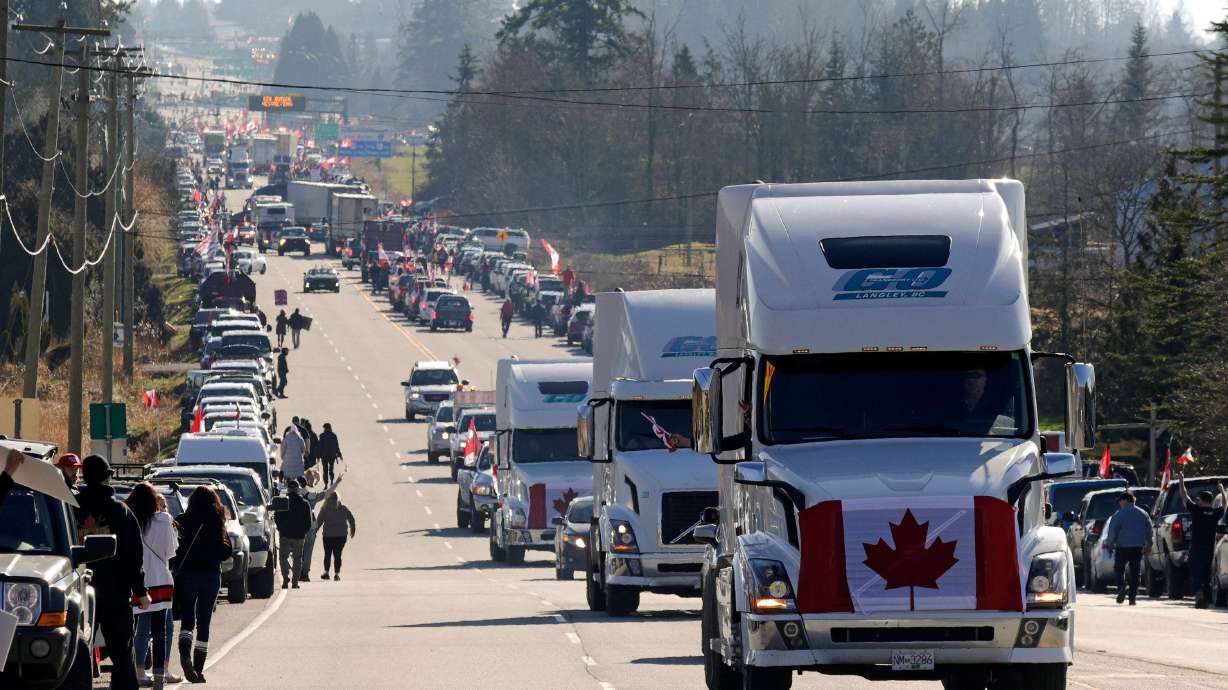Estimated read time: 4-5 minutes
This archived news story is available only for your personal, non-commercial use. Information in the story may be outdated or superseded by additional information. Reading or replaying the story in its archived form does not constitute a republication of the story.
COUTTS, Canada — Authorities have seized 13 long guns, handguns, multiple sets of body armor, a machete and a large quantity of ammunition and high-capacity magazines connected to a small, organized group within a larger protest at the Canadian-U.S. border crossing in Coutts, Alberta, the Royal Canadian Mounted Police said Monday.
The Coutts border crossing is one of several that has been blocked by protesters denouncing COVID-19 mandates.
"The group was said to have a willingness to use force against the police if any attempts were made to disrupt the blockade," the statement said. "This resulted in an immediate and complex investigation to determine the extent of the threat and criminal organization."
Police in Alberta said 11 people were arrested near the border crossing that connects Coutts to Sweet Grass, Montana.
After obtaining a warrant, police were able to search three trailers early Monday that were associated with the group.
The news comes after Ambassador Bridge — North America's busiest land border crossing — reopened Sunday and Ontario, Canada's most populous province, announced plans to loosen pandemic restrictions.
For almost a week, protesters blocked the bridge linking Windsor, Ontario, and Detroit — severing the key trade route and dealing economic blows to both the U.S. and Canada.
The bridge reopened Sunday night, allowing "the free flow of commerce between the Canada and U.S. economies once again," the Detroit International Bridge Company said.
Ontario Premier Doug Ford announced the next day he plans to drop the province's vaccine passport requirements on March 1 if its COVID-19 hospitalization rates continue to improve.
"The removal of these measures has always been our objective and something we have collectively worked towards for months now," Ford announced.
"Let me be very clear: We're moving in this direction because it's safe to do so," Ford said. "Today's announcement is not because of what's happening in Ottawa or Windsor but despite it."
The "Freedom Convoy" protesters' grievances stem from Canada's new mandate requiring truckers to either be fully vaccinated when crossing the Canadian-U.S. border or face a two-week quarantine.
The protest has attracted support from thousands more Canadians — even some who are fully vaccinated but say they want all COVID-19 preventative measures dropped.
About 4 in every 5 Canadians are fully vaccinated, Johns Hopkins University data shows. And nearly 90% of the country's truckers are fully vaccinated and eligible to cross the border, according to the Canadian government.
Among the relaxed restrictions on tap in Ontario are the removal of some event capacity limits as soon as Thursday. Ontario also has a goal to "lift proof of vaccination requirements for all settings" on March 1.
But Ontario residents must still wear masks "for just a little bit longer," Ford said.
"This is an important layer of protection that will allow us to proceed with our reopening plans."
Canada's capital gets flooded by protesters
Members of the protest convoy also have blocked Ottawa's downtown core and impeded border crossings between Alberta and Montana; Manitoba and North Dakota; and British Columbia and Washington state.
Truckers and their supporters have gathered in Ottawa since Jan. 29 to rally against mask mandates, lockdowns, restrictions on gatherings and other COVID-19 preventative measures.
Protesters will remain in the capital city "for as long as it takes for governments across Canada to end all mandates" associated with COVID-19, Freedom Convoy organizers said earlier this month.
But Ottawa Mayor Jim Watson said Sunday that he had reached an agreement with organizers for them to leave residential areas of downtown and restrict their demonstrations to streets directly in front of Canada's national parliament.
Residents this month have reported rock-throwing, property damage and harassment by protesters. Police said they had opened dozens of investigations, including into alleged hate crimes.
Some downtown Ottawa businesses have had to shut down temporarily.
American officials worried similar protests could soon erupt in the U.S. — perhaps near Sunday's Super Bowl in Southern California. And right-wing media outlets have raised the prospect of like-minded rallies in the U.S. and offered positive coverage of those in Canada.
But so far, the border blockades have been concentrated on the Canadian side.
Other border crossings blocked
Border blockades have emerged in several Canadian provinces at the U.S. border.
Protesters have used semitrailers — and sometimes farm equipment and other vehicles — to block the Coutts border access point between Alberta and Montana.
About 50 vehicles have blocked access since Thursday to the Canadian-U.S. border at Emerson, Manitoba, and Pembina, North Dakota, the Manitoba Royal Canadian Mounted Police said Saturday.
And in British Columbia, four people have been arrested near the Pacific Highway border crossing in Surrey, the national police said Sunday. "A few vehicles" broke through a police barricade there, they said.
"While no injuries were reported as a result of the incident, this had the potential for harm to pedestrians and first responders," Royal Canadian Mounted Police Cpl. Vanessa Munn said.
"This kind of behavior will not be tolerated and is being investigated."
Shortly before the Ambassador Bridge reopened, Windsor Mayor Drew Dilkens said the economic fallout from the blockade was ending.
"Today, our national economic crisis at the Ambassador bridge came to an end," Dilkens said Sunday.









